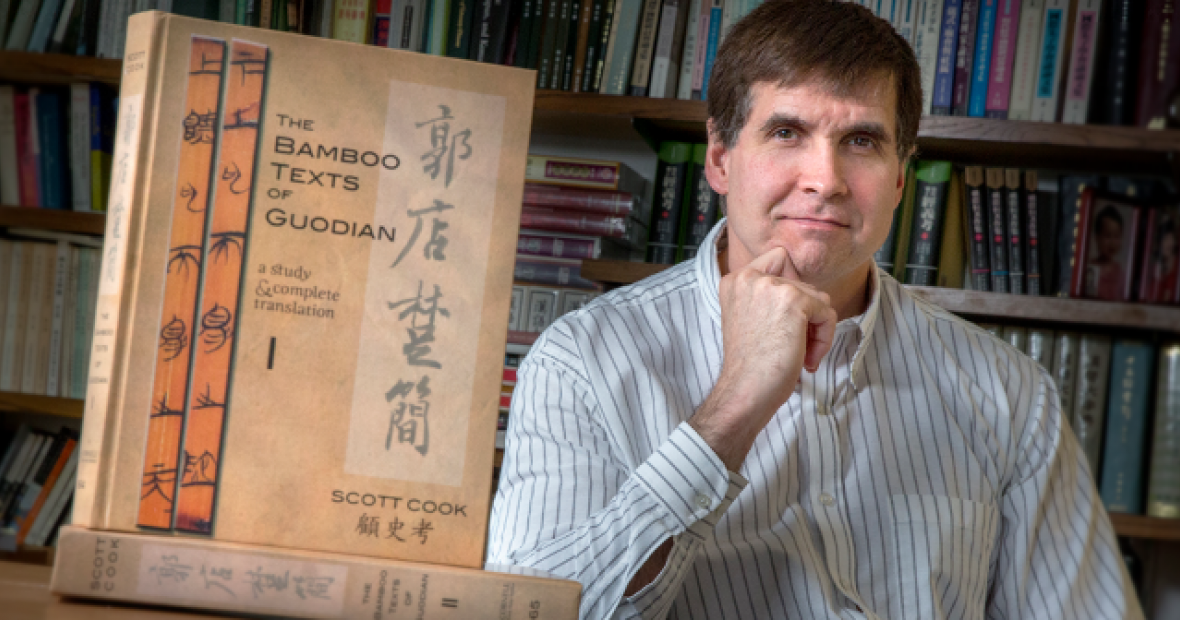Ancient Texts Revealed
In 1993, a tomb in Hubei Province, China, produced a trove of ancient texts as significant as the Dead Sea scrolls. The collection of Confucian and Daoist texts from around 300 B.C. is shedding new light on ancient Chinese philosophy, which is why Scott Cook, professor of Chinese at Grinnell College, crafted a definitive study and translation of the Guodian texts. The Bamboo Texts of Guodian: A study & complete translation is a 1,200-page, two-volume book that offers a complete transcription and translation of the 731 strips found in Hubei. The book was recently awarded “Honorable Mention” (first runner-up) for the Joseph Levenson Book Prize for the best book on pre-1900 China.
Cook’s book is the result of a 13-year effort, which he says was the time necessary to do the job properly. “I could have taken a year and done a haphazard translation,” he said. To digest all the scholarship on the Guodian texts and come up with his own line-by-line, character-by-character interpretation, Cook needed 13 years.
There have been a number of recent translation projects undertaken at Grinnell. English professor Tim Arner led a Mentored Advanced Project (MAP) that culminated in the publication of The Grinnell Beowulf, the first translation of the Anglo-Saxon epic completed by undergraduates for undergraduates. Jon Cohen ’14, with assistance from his professors, translated portions of Gamal Abdel Nasser’s 1962 national charter — the first English translation — to better understand how Nasser used Palestine to shape Egyptian and Arab nationalism. The motivation behind these and Cook’s translations is a combination of driven curiosity and the knowledge that once translated, these texts would be available to the hundreds of millions of English-speakers in the world.
One of the primary motivators for Cook to translate these works was his desire to make them accessible to English-speakers, teachers, and students. Early in the process, he talked to his editor to make sure The Bamboo Texts of Guodian contained an appendix of running translation so teachers could get access to his translation unencumbered by pages of textual footnotes and Chinese characters.
Chinese culture helps inform Cook’s teaching in Chinese language courses. Culture helps us understand why a certain combination of characters represents a word or concept. It provides a context in which to view language, and language indicates the way a culture thinks and how it goes about conceptualizing relationships at a basic level.
Cook was using forerunners of the current text years before his book was published in courses such as China’s Ancient World and Chinese Philosophical Tradition. Although the students benefitted from access to these texts, Cook also gained a lot by getting thoughts from his students. “Bouncing ideas off students keeps the whole enterprise alive,” says Cook. It keeps him from getting too narrowly focused, and he finds that having conversations with students helps him think more broadly about the texts and how to best present them.
“One of the most important things with these finds is to teach students to think about where these books come from,” says Cook. The Guodian texts help shed light specifically on the formulation of the Dao De Ching, but other texts also originated in ways that students might not initially have been aware of. Many of the texts that Cook’s students read were originally loose volumes that were put together only later and subsequently passed down as books. He encourages his students to think about when a set of texts became a book and how much authorship they can ascribe to a set of texts. The origination of these texts is not as simple as it seems, and he hopes to get his students to think more critically about issues such as this.
Professor Cook appeared on a recent web interview about his work, and his book.
Scott Cook is the Cowles-Kruidenier Chair of Chinese Studies.

